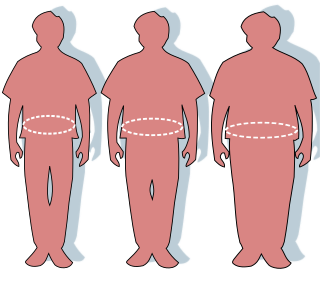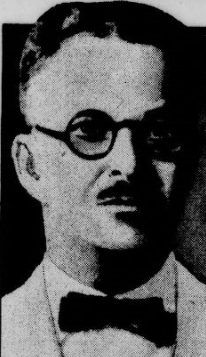
Obesity is a medical condition, sometimes considered a disease, in which excess body fat has accumulated to such an extent that it can potentially have negative effects on health. People are classified as obese when their body mass index (BMI)—a person's weight divided by the square of the person's height—is over 30 kg/m2; the range 25–30 kg/m2 is defined as overweight. Some East Asian countries use lower values to calculate obesity. Obesity is a major cause of disability and is correlated with various diseases and conditions, particularly cardiovascular diseases, type 2 diabetes, obstructive sleep apnea, certain types of cancer, and osteoarthritis.

Weight loss, in the context of medicine, health, or physical fitness, refers to a reduction of the total body mass, by a mean loss of fluid, body fat, or lean mass. Weight loss can either occur unintentionally because of malnourishment or an underlying disease, or from a conscious effort to improve an actual or perceived overweight or obese state. "Unexplained" weight loss that is not caused by reduction in calorific intake or increase in exercise is called cachexia and may be a symptom of a serious medical condition.
An anorectic or anorexic is a drug which reduces appetite, resulting in lower food consumption, leading to weight loss. These substances work by affecting the central nervous system or certain neurotransmitters to create a feeling of fullness or reduce the desire to eat. The understanding of anorexiant effects is crucial in the development of interventions for weight management, eating disorders, and related health concerns. The anorexiant effect can be induced through diverse mechanisms, ranging from hormonal regulation to neural signaling. Ghrelin, leptin, and peptide YY are among the hormones involved in appetite control. Additionally, neurotransmitters such as serotonin and dopamine in the central nervous system contribute significantly to the regulation of food intake.
Howard Choi is a physician in the United States and the principal editor of a physical medicine and rehabilitation (PM&R) handbook, PM&R Pocketpedia, and a companion book, Pain Medicine Pocketpedia. Award for Choi include the American Medical Association Foundation Leadership Award (2001) and the Foundation for PM&R New Investigator Award (2004).
The Corpulence Index (CI) is a measure of corpulence, or of leanness in other variants, of a person calculated as a relationship between mass and height. It was first proposed in 1921 as the "Corpulence measure" by Swiss physician Fritz Rohrer and hence is also known as Rohrer's Index. It is similar to the body mass index, but the mass is normalized with the third power of body height rather than the second power. In 2015, Sultan Babar showed that CI does not need to be adjusted for height after adolescence.
Barry S. Levy is a physician and former president of the American Public Health Association.
Louis J. Aronne is an American physician and author who is an obesity medicine specialist. He is quoted in the news media as an expert in the field of weight research. He is perhaps best known for diagnosing David Letterman's heart condition in 2000. His book, released in 2009, The Skinny on Losing Weight Without Being Hungry is a NY Times best-seller. His book, The Change Your Biology Diet: The Proven Program for Lifelong Weight Loss with a foreword by David Letterman was published on January 5, 2016.
Management of obesity can include lifestyle changes, medications, or surgery. Although many studies have sought effective interventions, there is currently no evidence-based, well-defined, and efficient intervention to prevent obesity.
Peter Jerome Fagan is an American psychologist who served as director of the Sexual Behaviors Consultation Unit at Johns Hopkins University from 1985 to 2004.
Obesity medicine is a field of medicine dedicated to the comprehensive treatment of patients with obesity. Obesity medicine takes into account the multi-factorial etiology of obesity in which behavior, development, environment, epigenetic, genetic, nutrition, physiology, and psychosocial contributors all play a role. As time progresses, we become more knowledgeable about the complexity of obesity, and we have ascertained that there is a certain skill set and knowledge base that is required to treat this patient population. Clinicians in the field should understand how a myriad of factors contribute to obesity including: gut microbiota diversity, regulation of food intake and energy balance through enteroendocrine and neuroregulation, and adipokine physiology. Obesity medicine physicians should be skilled in identifying factors which have contributed to obesity and know how to employ methods to treat obesity. No two people with obesity are alike, and it is important to approach each patient as an individual to determine which factors contributed to their obesity in order to effectively treat each patient. Physicians specializing in obesity medicine may choose to obtain board certification by the American Board of Obesity Medicine.
Frank Aram Oski was an American pediatrician. After holding several faculty positions at medical schools, he spent several years as the chair of pediatrics at Johns Hopkins School of Medicine. He was the founder and editor of the journal Contemporary Pediatrics, and he edited one of the most widely read textbooks in pediatrics.
George A. Bray is an American obesity researcher. As of 2016, he is a University Professor emeritus and formerly the chief of the division of clinical obesity and metabolism at Louisiana State University's Pennington Biomedical Research Center in Baton Rouge. He is also a Boyd Professor emeritus at the Pennington Center, and a professor of medicine emeritus at the Louisiana State University Medical Center.
Rohit Varma is an Indian-American ophthalmologist and professor of ophthalmology and preventive medicine. In 2014, he was named director of the USC Eye Institute and chairman of the Department of Ophthalmology for Keck School of Medicine of USC. In March 2016, Varma was named the interim dean of the Keck School of Medicine, and in November was named dean. In October 2017, USC announced that he stepped down as dean. In October 2018, Varma became the founding director of the Southern California Eyecare and Vision Research Institute.
AEIOU-TIPS is a mnemonic acronym used by some medical professionals to recall the possible causes for altered mental status. Medical literature discusses its utility in determining differential diagnoses in various special populations presenting with altered mental status including infants, children, adolescents, and the elderly. The mnemonic also frequently appears in textbooks and reference books regarding emergency medicine in a variety of settings, from the emergency department and standard emergency medical services to wilderness medicine.
Robert H. Eckel is an American endocrinologist. He holds the Charles A. Boettcher II Endowed Chair in atherosclerosis at the University of Colorado Denver, where he is also a professor of medicine and professor of physiology and biophysics. In 2016 Eckel was among the recipients of the Laureate Awards of the Endocrine Society, as Outstanding Clinical Investigator. He has done significant research in the biology and pathophysiology of lipoprotein lipase.

Preventive Nutrition is a branch of nutrition science with the goal of preventing, delaying, and/or reducing the impacts of disease and disease-related complications. It is concerned with a high level of personal well-being, disease prevention, and diagnosis of recurring health problems or symptoms of discomfort which are often precursors to health issues. The overweight and obese population numbers have increased over the last 40 years and numerous chronic diseases are associated with obesity. Preventive nutrition may assist in prolonging the onset of non-communicable diseases and may allow adults to experience more "healthy living years." There are various ways of educating the public about preventive nutrition. Information regarding preventive nutrition is often communicated through public health forums, government programs and policies, or nutritional education. For example, in the United States, preventive nutrition is taught to the public through the use of the food pyramid or MyPlate initiatives.
Edward C. Halperin, is the chancellor and CEO of New York Medical College (NYMC) where he is also a professor of radiation medicine, pediatrics and history. He also serves as the Miriam Popack Chair in Biomedical Ethics and director of the Hirth and Samowitz Center for Medical Humanities and Holocaust Studies at NYMC, director of bioethics in the School of Health Sciences and Practice at NYMC, as well as provost for biomedical affairs for the Touro College and University System, a position he has held since 2012.

George Argale Harrop was an American physician, nutritionist and writer.
Gelesis100, sold under the brand name Plenity, is an oral hydrogel used to treat overweight and obesity. It absorbs water and expands in the stomach and small bowel thereby increasing feelings of fullness. Possible side effects include primarily gastrointestinal symptoms, such as diarrhea, abdominal distention, infrequent bowel movements, constipation, abdominal pain, and flatulence. It is contraindicated in pregnancy, chronic malabsorption syndromes, and cholestasis. The US Food and Drug Administration approved it in 2019 as a medical device. Gelesis100 was developed by the company Gelesis.

Fatima Cody Stanford is an American obesity medicine physician, internist, and pediatrician and an associate professor of medicine and pediatrics at Harvard Medical School. She is one of the most highly cited scientists in the field of obesity. She is recognized for shifting the global perception of obesity as a chronic disease.




